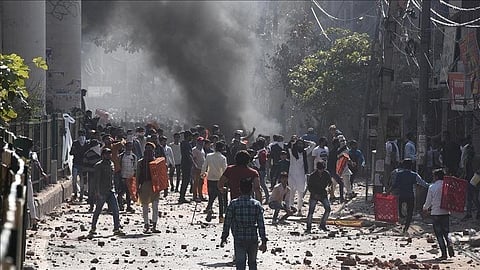
- Home
- NewsGram USA
- India
- न्यूजग्राम
- World
- Politics
- Entertainment
- Culture
- Lifestyle
- Economy
- Sports
- Sp. Coverage
- Misc.
- NewsGram Exclusive
- Jobs / Internships

The Supreme Court heard bail pleas of Umar Khalid, Sharjeel Imam and others in the 2020 Delhi riots case
Delhi Police opposed bail, presenting videos, WhatsApp chats and witness statements as evidence
Defence argued only selective clips were shown to “create prejudice”
The Supreme Court on Thursday, November 20, 2025, heard the bail pleas of Umar Khalid, Sharjeel Imam, Gulfisha Fatima, Meeran Haider, Mohd. Saleem Khan and Shadab Ahmed. They are in jail in the alleged ‘larger conspiracy’ case linked to the 2020 Northeast Delhi riots. A Bench of Justices Aravind Kumar and N.V. Anjaria continued hearing arguments, with proceedings set to resume on Friday.
During the hearing, Additional Solicitor General (ASG) S.V. Raju, representing the Delhi Police, strongly opposed the bail requests, arguing that the accused could not rely on delay in trial as a ground for release and had themselves sought repeated adjournments. The Bench asked the Delhi Police to complete their counterarguments the following day.
The Delhi Police played in court a series of videos of Sharjeel Imam’s speeches from 2019–2020, claiming they formed part of the chargesheet. Raju argued that the speeches were “inflammatory,” alleging they called for blockades, economic disruption, and even the “separation of Assam” from India. He said protests against the Citizenship Amendment Act (CAA) were used as a “red herring” to mask a “planned regime-change operation.”
Raju repeatedly referred to the accused as “intellectuals are more dangerous than the ground-level terrorists,” claiming that professionals such as doctors and engineers were increasingly engaging in “anti-national activities.” He said the alleged conspiracy was designed to coincide with then U.S. President Donald Trump’s February 2020 India visit to draw international attention.
Senior advocate Siddharth Dave, appearing for some petitioners, objected that only “select micro-clips” of long speeches were being shown to create prejudice. The Bench, however, noted that the videos formed part of the chargesheet and would be considered accordingly.
The police told the Court the case involved extensive evidence, including 47 protected witnesses—38 of whom recorded statements before a magistrate—and more than 150 public witnesses. The ASG maintained that the alleged acts were not part of a peaceful protest but a “pre-planned and well-executed conspiracy,” citing WhatsApp groups like MSJ, JCC and DPSG as platforms used for coordination.
The Court also noted that none of the accused sought bail on merits; instead, they invoked prolonged incarceration. Khalid has been in prison since September 2020, and earlier bail attempts were rejected by both the trial court and the Delhi High Court.
The riots erupted in February 2020 amid protests against the Citizenship Amendment Act (CAA) and the National Register of Citizens (NRC). Violent clashes in parts of Northeast Delhi resulted in 53 deaths and left more than 700 people injured.
The Delhi Police’s ‘larger conspiracy’ case, investigated by the Special Cell, alleges that the violence was not spontaneous but coordinated. According to the chargesheet, Umar Khalid, Sharjeel Imam and others orchestrated unrest through speeches, meetings, and multiple WhatsApp groups designed to mobilise protests, block roads, disrupt supplies, and draw international attention. They have been charged under various sections of the Indian Penal Code and the Unlawful Activities (Prevention) Act (UAPA).
Most of the accused have been in custody since 2020. Umar Khalid, arrested in September 2020, has spent over five years in jail without trial. His previous bail pleas were rejected by both the trial court and the Delhi High Court, and his petition before the Supreme Court has faced several adjournments.
The Supreme Court is scheduled to continue hearing the matter on Friday, when the Delhi Police is expected to conclude its arguments. [VP]
Suggested Read:
